An Analysis of Leadership and Management Theories and Practices
VerifiedAdded on 2023/01/12
|15
|5169
|34
Essay
AI Summary
This essay delves into the fundamental concepts of leadership and management, highlighting their similarities and differences. It explores various leadership theories, including the contingency theory, and examines the characteristics of effective leaders and managers. The essay then focuses on the Edward Jenner leadership program offered by the NHS Leadership Academy, analyzing its importance, benefits for individuals and organizations, and the program's eligibility criteria and intended outcomes. The discussion covers the program's foundation and provides a comprehensive overview of leadership development within the context of the healthcare sector. The essay also touches on the importance of leadership training and development for organizational success. Overall, the essay provides a detailed analysis of leadership and management principles and their practical application within the context of a real-world leadership program.

LEADERSHIP AND
MANAGEMENT
MANAGEMENT
Paraphrase This Document
Need a fresh take? Get an instant paraphrase of this document with our AI Paraphraser
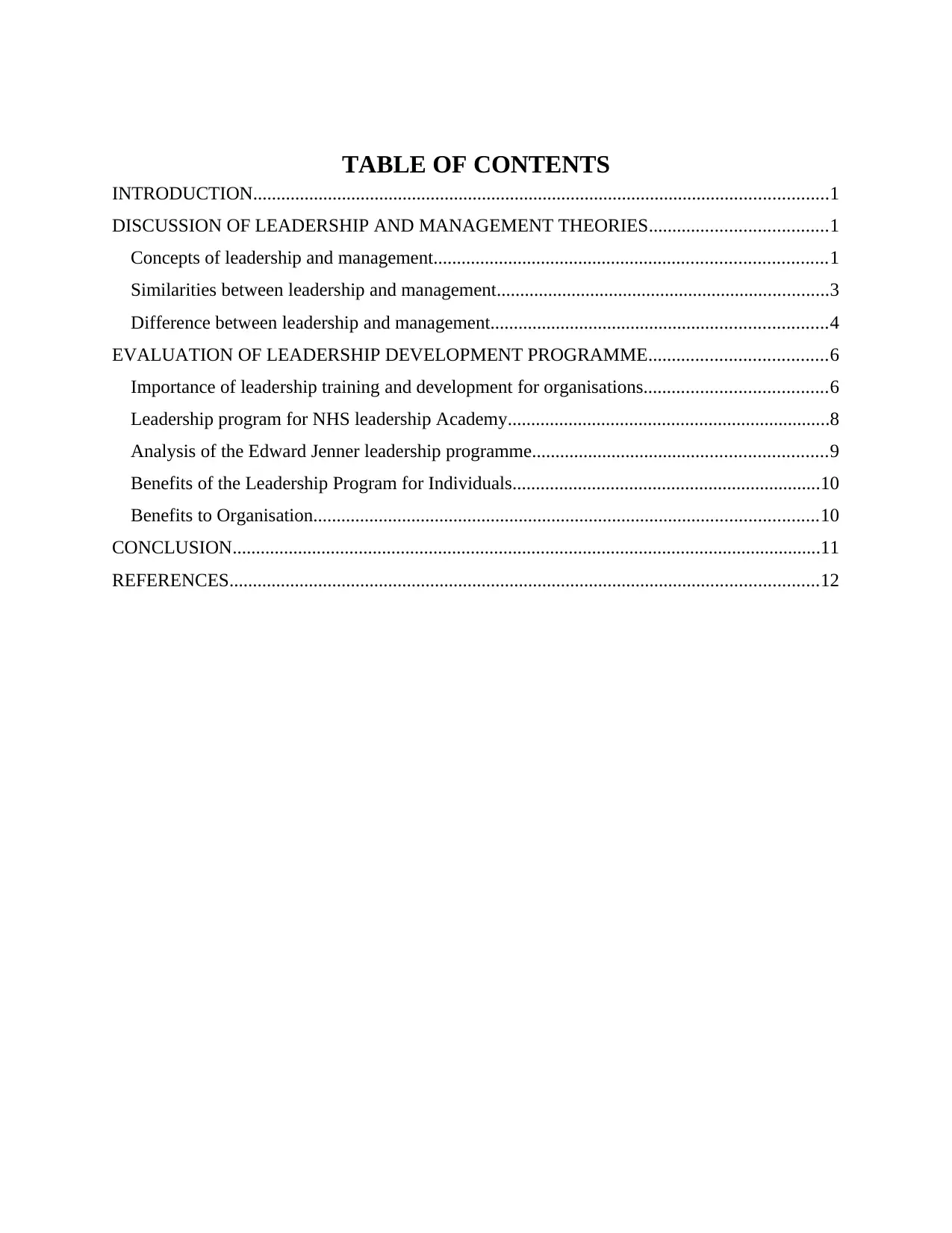
TABLE OF CONTENTS
INTRODUCTION...........................................................................................................................1
DISCUSSION OF LEADERSHIP AND MANAGEMENT THEORIES......................................1
Concepts of leadership and management....................................................................................1
Similarities between leadership and management.......................................................................3
Difference between leadership and management........................................................................4
EVALUATION OF LEADERSHIP DEVELOPMENT PROGRAMME......................................6
Importance of leadership training and development for organisations.......................................6
Leadership program for NHS leadership Academy.....................................................................8
Analysis of the Edward Jenner leadership programme...............................................................9
Benefits of the Leadership Program for Individuals..................................................................10
Benefits to Organisation............................................................................................................10
CONCLUSION..............................................................................................................................11
REFERENCES..............................................................................................................................12
INTRODUCTION...........................................................................................................................1
DISCUSSION OF LEADERSHIP AND MANAGEMENT THEORIES......................................1
Concepts of leadership and management....................................................................................1
Similarities between leadership and management.......................................................................3
Difference between leadership and management........................................................................4
EVALUATION OF LEADERSHIP DEVELOPMENT PROGRAMME......................................6
Importance of leadership training and development for organisations.......................................6
Leadership program for NHS leadership Academy.....................................................................8
Analysis of the Edward Jenner leadership programme...............................................................9
Benefits of the Leadership Program for Individuals..................................................................10
Benefits to Organisation............................................................................................................10
CONCLUSION..............................................................................................................................11
REFERENCES..............................................................................................................................12
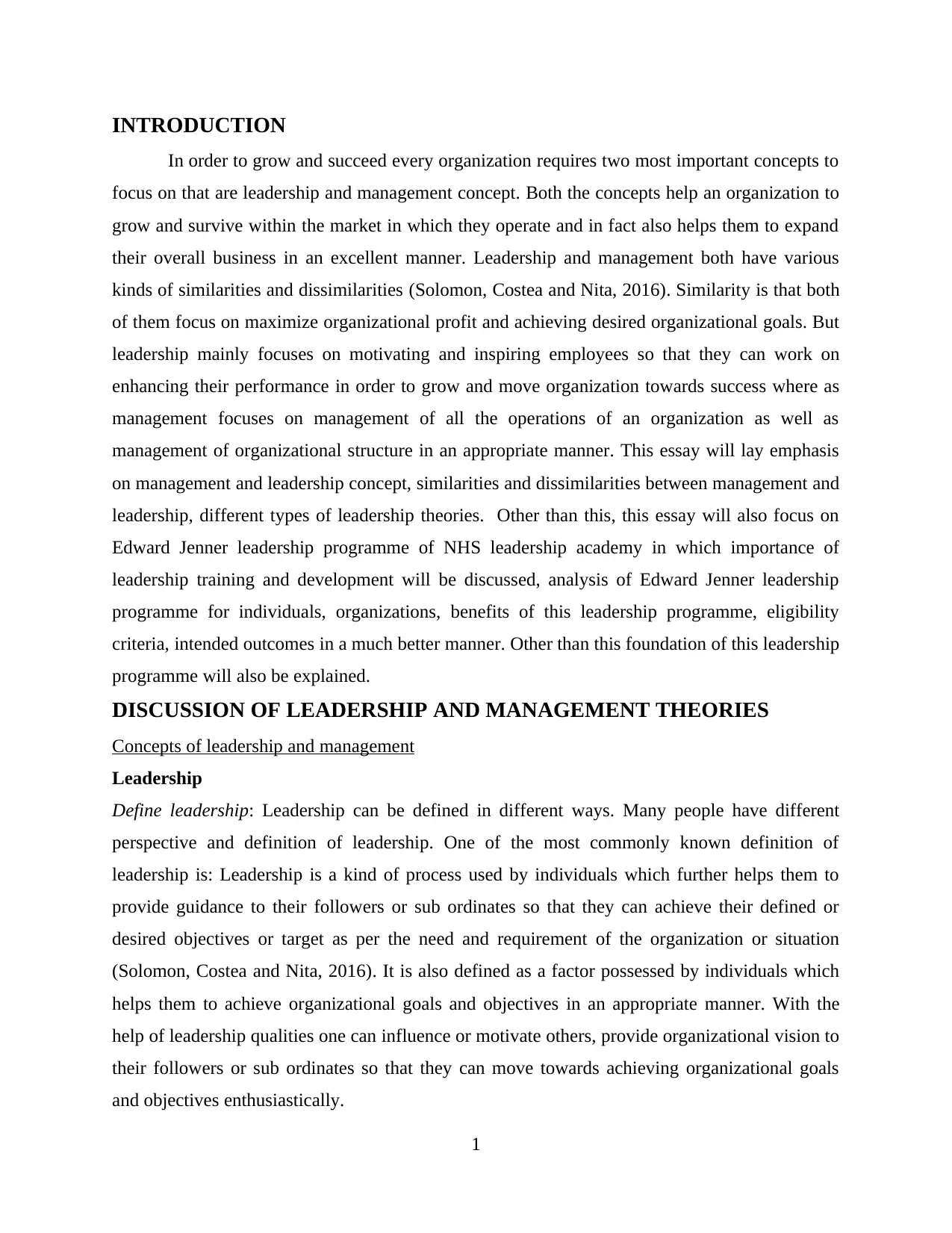
INTRODUCTION
In order to grow and succeed every organization requires two most important concepts to
focus on that are leadership and management concept. Both the concepts help an organization to
grow and survive within the market in which they operate and in fact also helps them to expand
their overall business in an excellent manner. Leadership and management both have various
kinds of similarities and dissimilarities (Solomon, Costea and Nita, 2016). Similarity is that both
of them focus on maximize organizational profit and achieving desired organizational goals. But
leadership mainly focuses on motivating and inspiring employees so that they can work on
enhancing their performance in order to grow and move organization towards success where as
management focuses on management of all the operations of an organization as well as
management of organizational structure in an appropriate manner. This essay will lay emphasis
on management and leadership concept, similarities and dissimilarities between management and
leadership, different types of leadership theories. Other than this, this essay will also focus on
Edward Jenner leadership programme of NHS leadership academy in which importance of
leadership training and development will be discussed, analysis of Edward Jenner leadership
programme for individuals, organizations, benefits of this leadership programme, eligibility
criteria, intended outcomes in a much better manner. Other than this foundation of this leadership
programme will also be explained.
DISCUSSION OF LEADERSHIP AND MANAGEMENT THEORIES
Concepts of leadership and management
Leadership
Define leadership: Leadership can be defined in different ways. Many people have different
perspective and definition of leadership. One of the most commonly known definition of
leadership is: Leadership is a kind of process used by individuals which further helps them to
provide guidance to their followers or sub ordinates so that they can achieve their defined or
desired objectives or target as per the need and requirement of the organization or situation
(Solomon, Costea and Nita, 2016). It is also defined as a factor possessed by individuals which
helps them to achieve organizational goals and objectives in an appropriate manner. With the
help of leadership qualities one can influence or motivate others, provide organizational vision to
their followers or sub ordinates so that they can move towards achieving organizational goals
and objectives enthusiastically.
1
In order to grow and succeed every organization requires two most important concepts to
focus on that are leadership and management concept. Both the concepts help an organization to
grow and survive within the market in which they operate and in fact also helps them to expand
their overall business in an excellent manner. Leadership and management both have various
kinds of similarities and dissimilarities (Solomon, Costea and Nita, 2016). Similarity is that both
of them focus on maximize organizational profit and achieving desired organizational goals. But
leadership mainly focuses on motivating and inspiring employees so that they can work on
enhancing their performance in order to grow and move organization towards success where as
management focuses on management of all the operations of an organization as well as
management of organizational structure in an appropriate manner. This essay will lay emphasis
on management and leadership concept, similarities and dissimilarities between management and
leadership, different types of leadership theories. Other than this, this essay will also focus on
Edward Jenner leadership programme of NHS leadership academy in which importance of
leadership training and development will be discussed, analysis of Edward Jenner leadership
programme for individuals, organizations, benefits of this leadership programme, eligibility
criteria, intended outcomes in a much better manner. Other than this foundation of this leadership
programme will also be explained.
DISCUSSION OF LEADERSHIP AND MANAGEMENT THEORIES
Concepts of leadership and management
Leadership
Define leadership: Leadership can be defined in different ways. Many people have different
perspective and definition of leadership. One of the most commonly known definition of
leadership is: Leadership is a kind of process used by individuals which further helps them to
provide guidance to their followers or sub ordinates so that they can achieve their defined or
desired objectives or target as per the need and requirement of the organization or situation
(Solomon, Costea and Nita, 2016). It is also defined as a factor possessed by individuals which
helps them to achieve organizational goals and objectives in an appropriate manner. With the
help of leadership qualities one can influence or motivate others, provide organizational vision to
their followers or sub ordinates so that they can move towards achieving organizational goals
and objectives enthusiastically.
1
⊘ This is a preview!⊘
Do you want full access?
Subscribe today to unlock all pages.

Trusted by 1+ million students worldwide
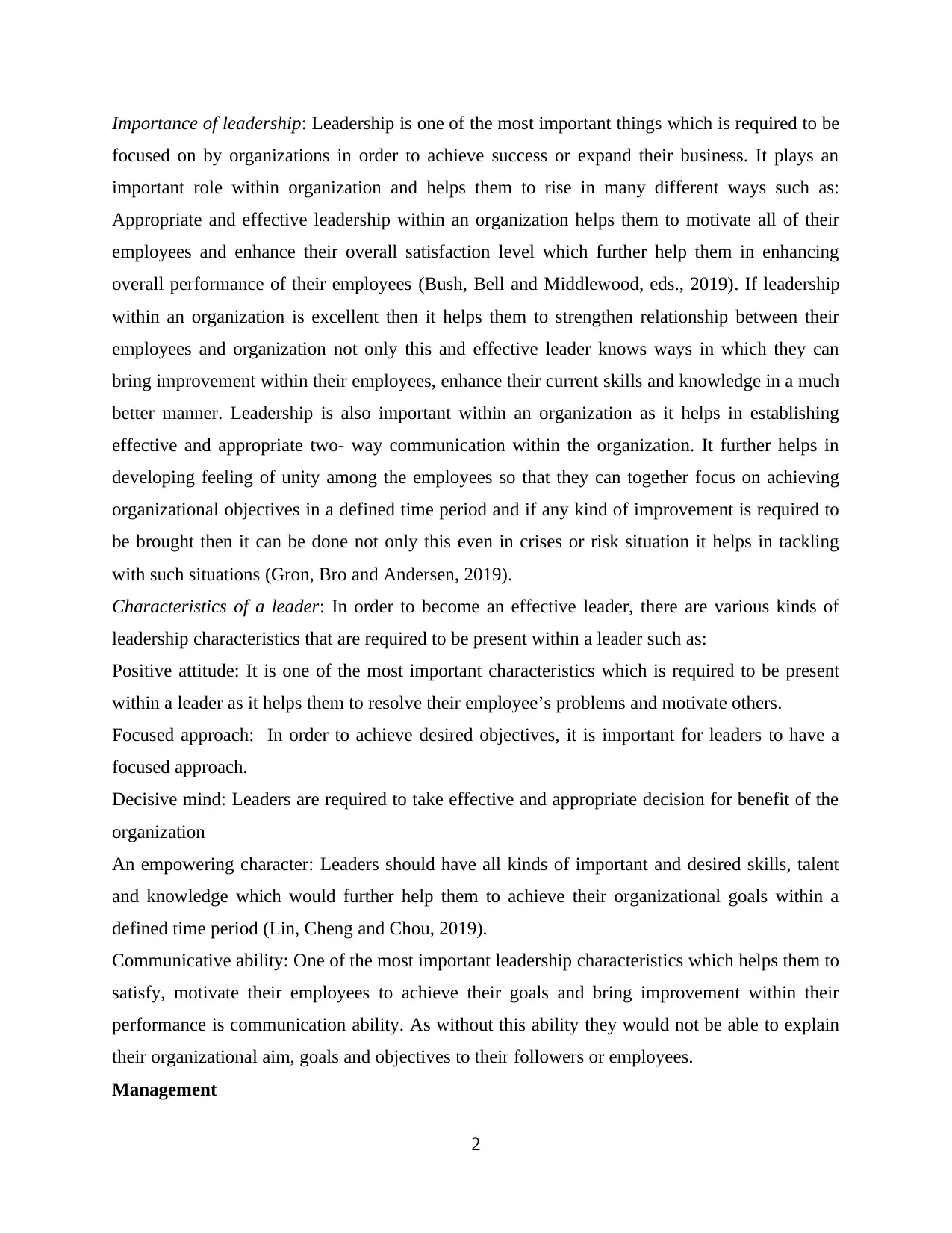
Importance of leadership: Leadership is one of the most important things which is required to be
focused on by organizations in order to achieve success or expand their business. It plays an
important role within organization and helps them to rise in many different ways such as:
Appropriate and effective leadership within an organization helps them to motivate all of their
employees and enhance their overall satisfaction level which further help them in enhancing
overall performance of their employees (Bush, Bell and Middlewood, eds., 2019). If leadership
within an organization is excellent then it helps them to strengthen relationship between their
employees and organization not only this and effective leader knows ways in which they can
bring improvement within their employees, enhance their current skills and knowledge in a much
better manner. Leadership is also important within an organization as it helps in establishing
effective and appropriate two- way communication within the organization. It further helps in
developing feeling of unity among the employees so that they can together focus on achieving
organizational objectives in a defined time period and if any kind of improvement is required to
be brought then it can be done not only this even in crises or risk situation it helps in tackling
with such situations (Gron, Bro and Andersen, 2019).
Characteristics of a leader: In order to become an effective leader, there are various kinds of
leadership characteristics that are required to be present within a leader such as:
Positive attitude: It is one of the most important characteristics which is required to be present
within a leader as it helps them to resolve their employee’s problems and motivate others.
Focused approach: In order to achieve desired objectives, it is important for leaders to have a
focused approach.
Decisive mind: Leaders are required to take effective and appropriate decision for benefit of the
organization
An empowering character: Leaders should have all kinds of important and desired skills, talent
and knowledge which would further help them to achieve their organizational goals within a
defined time period (Lin, Cheng and Chou, 2019).
Communicative ability: One of the most important leadership characteristics which helps them to
satisfy, motivate their employees to achieve their goals and bring improvement within their
performance is communication ability. As without this ability they would not be able to explain
their organizational aim, goals and objectives to their followers or employees.
Management
2
focused on by organizations in order to achieve success or expand their business. It plays an
important role within organization and helps them to rise in many different ways such as:
Appropriate and effective leadership within an organization helps them to motivate all of their
employees and enhance their overall satisfaction level which further help them in enhancing
overall performance of their employees (Bush, Bell and Middlewood, eds., 2019). If leadership
within an organization is excellent then it helps them to strengthen relationship between their
employees and organization not only this and effective leader knows ways in which they can
bring improvement within their employees, enhance their current skills and knowledge in a much
better manner. Leadership is also important within an organization as it helps in establishing
effective and appropriate two- way communication within the organization. It further helps in
developing feeling of unity among the employees so that they can together focus on achieving
organizational objectives in a defined time period and if any kind of improvement is required to
be brought then it can be done not only this even in crises or risk situation it helps in tackling
with such situations (Gron, Bro and Andersen, 2019).
Characteristics of a leader: In order to become an effective leader, there are various kinds of
leadership characteristics that are required to be present within a leader such as:
Positive attitude: It is one of the most important characteristics which is required to be present
within a leader as it helps them to resolve their employee’s problems and motivate others.
Focused approach: In order to achieve desired objectives, it is important for leaders to have a
focused approach.
Decisive mind: Leaders are required to take effective and appropriate decision for benefit of the
organization
An empowering character: Leaders should have all kinds of important and desired skills, talent
and knowledge which would further help them to achieve their organizational goals within a
defined time period (Lin, Cheng and Chou, 2019).
Communicative ability: One of the most important leadership characteristics which helps them to
satisfy, motivate their employees to achieve their goals and bring improvement within their
performance is communication ability. As without this ability they would not be able to explain
their organizational aim, goals and objectives to their followers or employees.
Management
2
Paraphrase This Document
Need a fresh take? Get an instant paraphrase of this document with our AI Paraphraser
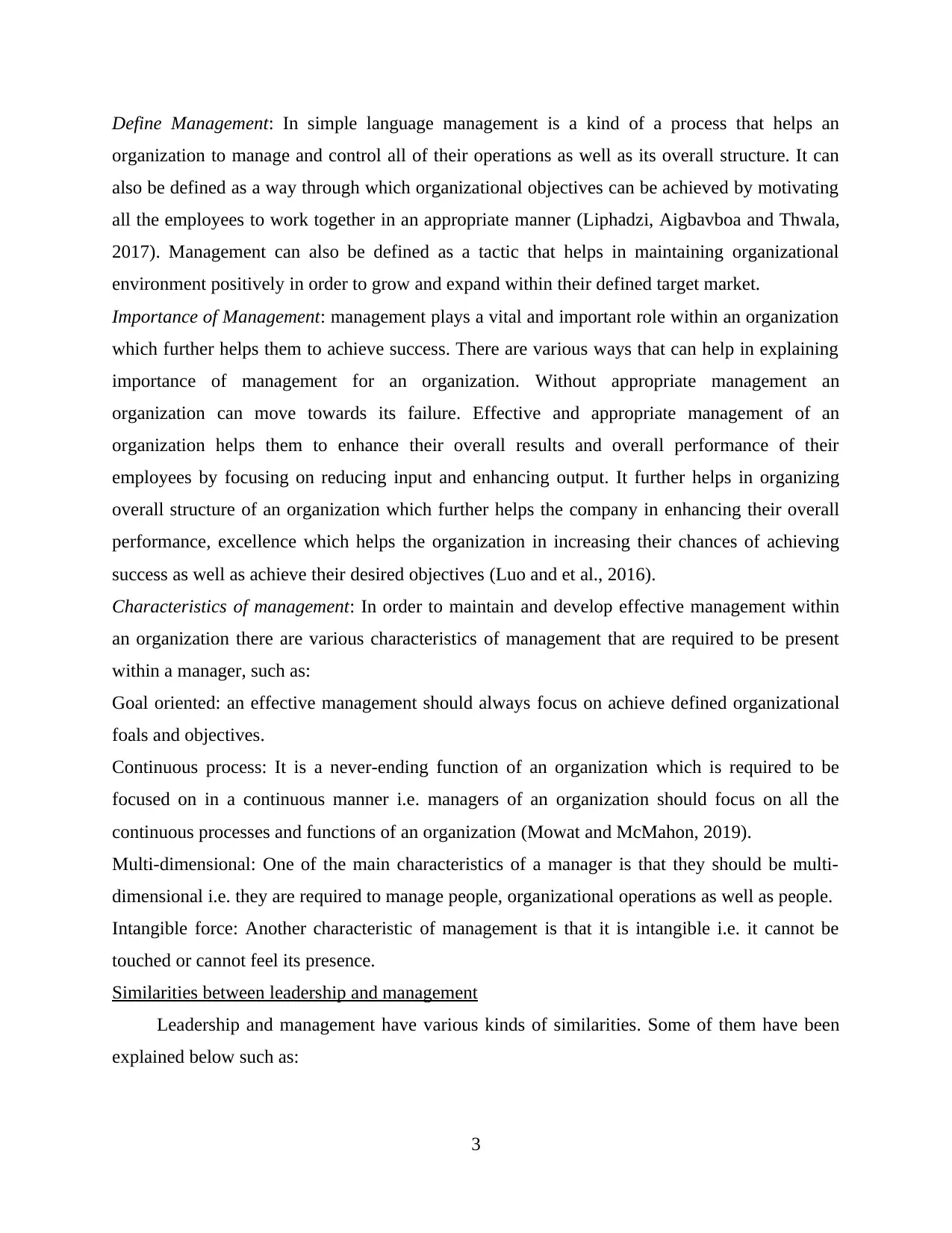
Define Management: In simple language management is a kind of a process that helps an
organization to manage and control all of their operations as well as its overall structure. It can
also be defined as a way through which organizational objectives can be achieved by motivating
all the employees to work together in an appropriate manner (Liphadzi, Aigbavboa and Thwala,
2017). Management can also be defined as a tactic that helps in maintaining organizational
environment positively in order to grow and expand within their defined target market.
Importance of Management: management plays a vital and important role within an organization
which further helps them to achieve success. There are various ways that can help in explaining
importance of management for an organization. Without appropriate management an
organization can move towards its failure. Effective and appropriate management of an
organization helps them to enhance their overall results and overall performance of their
employees by focusing on reducing input and enhancing output. It further helps in organizing
overall structure of an organization which further helps the company in enhancing their overall
performance, excellence which helps the organization in increasing their chances of achieving
success as well as achieve their desired objectives (Luo and et al., 2016).
Characteristics of management: In order to maintain and develop effective management within
an organization there are various characteristics of management that are required to be present
within a manager, such as:
Goal oriented: an effective management should always focus on achieve defined organizational
foals and objectives.
Continuous process: It is a never-ending function of an organization which is required to be
focused on in a continuous manner i.e. managers of an organization should focus on all the
continuous processes and functions of an organization (Mowat and McMahon, 2019).
Multi-dimensional: One of the main characteristics of a manager is that they should be multi-
dimensional i.e. they are required to manage people, organizational operations as well as people.
Intangible force: Another characteristic of management is that it is intangible i.e. it cannot be
touched or cannot feel its presence.
Similarities between leadership and management
Leadership and management have various kinds of similarities. Some of them have been
explained below such as:
3
organization to manage and control all of their operations as well as its overall structure. It can
also be defined as a way through which organizational objectives can be achieved by motivating
all the employees to work together in an appropriate manner (Liphadzi, Aigbavboa and Thwala,
2017). Management can also be defined as a tactic that helps in maintaining organizational
environment positively in order to grow and expand within their defined target market.
Importance of Management: management plays a vital and important role within an organization
which further helps them to achieve success. There are various ways that can help in explaining
importance of management for an organization. Without appropriate management an
organization can move towards its failure. Effective and appropriate management of an
organization helps them to enhance their overall results and overall performance of their
employees by focusing on reducing input and enhancing output. It further helps in organizing
overall structure of an organization which further helps the company in enhancing their overall
performance, excellence which helps the organization in increasing their chances of achieving
success as well as achieve their desired objectives (Luo and et al., 2016).
Characteristics of management: In order to maintain and develop effective management within
an organization there are various characteristics of management that are required to be present
within a manager, such as:
Goal oriented: an effective management should always focus on achieve defined organizational
foals and objectives.
Continuous process: It is a never-ending function of an organization which is required to be
focused on in a continuous manner i.e. managers of an organization should focus on all the
continuous processes and functions of an organization (Mowat and McMahon, 2019).
Multi-dimensional: One of the main characteristics of a manager is that they should be multi-
dimensional i.e. they are required to manage people, organizational operations as well as people.
Intangible force: Another characteristic of management is that it is intangible i.e. it cannot be
touched or cannot feel its presence.
Similarities between leadership and management
Leadership and management have various kinds of similarities. Some of them have been
explained below such as:
3
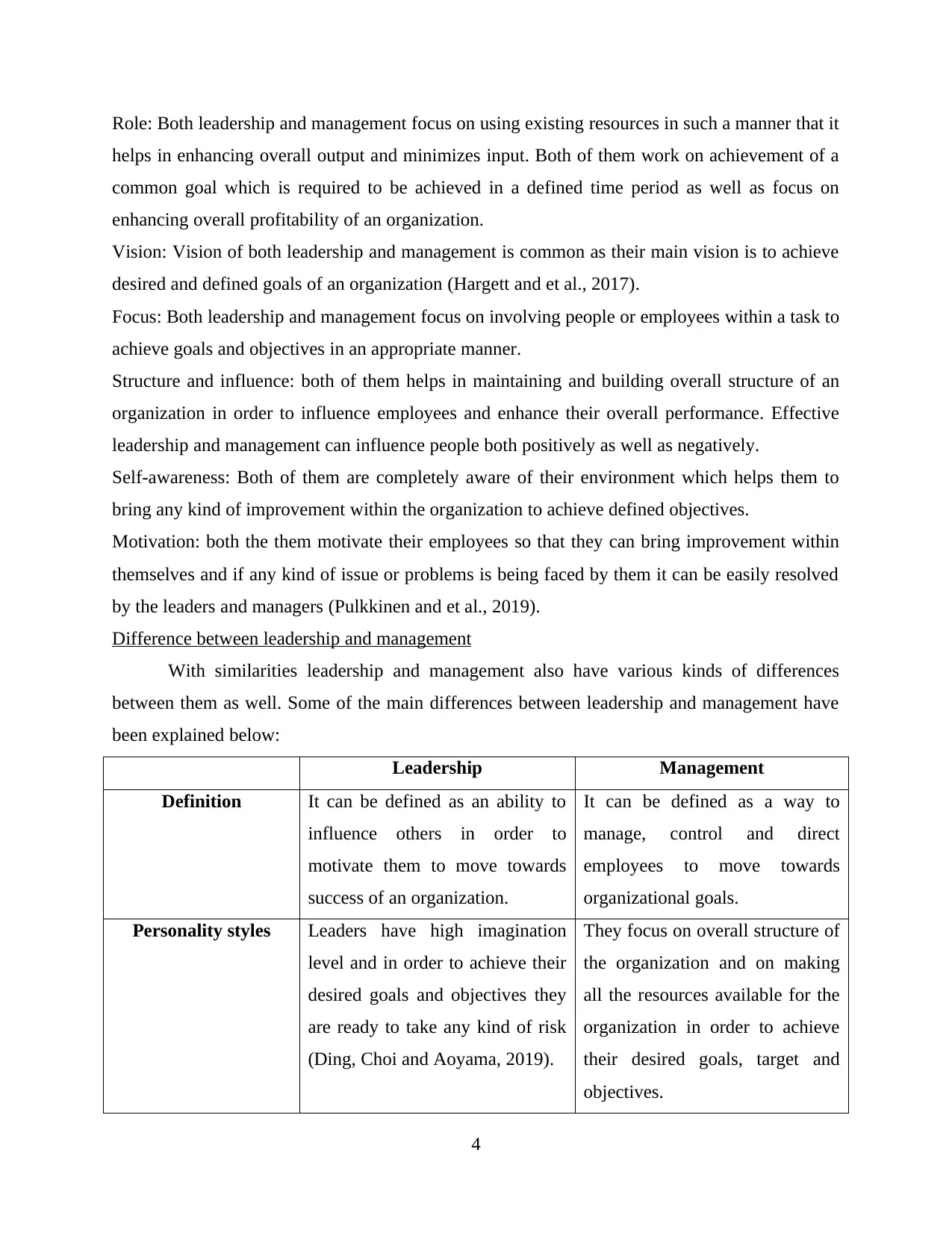
Role: Both leadership and management focus on using existing resources in such a manner that it
helps in enhancing overall output and minimizes input. Both of them work on achievement of a
common goal which is required to be achieved in a defined time period as well as focus on
enhancing overall profitability of an organization.
Vision: Vision of both leadership and management is common as their main vision is to achieve
desired and defined goals of an organization (Hargett and et al., 2017).
Focus: Both leadership and management focus on involving people or employees within a task to
achieve goals and objectives in an appropriate manner.
Structure and influence: both of them helps in maintaining and building overall structure of an
organization in order to influence employees and enhance their overall performance. Effective
leadership and management can influence people both positively as well as negatively.
Self-awareness: Both of them are completely aware of their environment which helps them to
bring any kind of improvement within the organization to achieve defined objectives.
Motivation: both the them motivate their employees so that they can bring improvement within
themselves and if any kind of issue or problems is being faced by them it can be easily resolved
by the leaders and managers (Pulkkinen and et al., 2019).
Difference between leadership and management
With similarities leadership and management also have various kinds of differences
between them as well. Some of the main differences between leadership and management have
been explained below:
Leadership Management
Definition It can be defined as an ability to
influence others in order to
motivate them to move towards
success of an organization.
It can be defined as a way to
manage, control and direct
employees to move towards
organizational goals.
Personality styles Leaders have high imagination
level and in order to achieve their
desired goals and objectives they
are ready to take any kind of risk
(Ding, Choi and Aoyama, 2019).
They focus on overall structure of
the organization and on making
all the resources available for the
organization in order to achieve
their desired goals, target and
objectives.
4
helps in enhancing overall output and minimizes input. Both of them work on achievement of a
common goal which is required to be achieved in a defined time period as well as focus on
enhancing overall profitability of an organization.
Vision: Vision of both leadership and management is common as their main vision is to achieve
desired and defined goals of an organization (Hargett and et al., 2017).
Focus: Both leadership and management focus on involving people or employees within a task to
achieve goals and objectives in an appropriate manner.
Structure and influence: both of them helps in maintaining and building overall structure of an
organization in order to influence employees and enhance their overall performance. Effective
leadership and management can influence people both positively as well as negatively.
Self-awareness: Both of them are completely aware of their environment which helps them to
bring any kind of improvement within the organization to achieve defined objectives.
Motivation: both the them motivate their employees so that they can bring improvement within
themselves and if any kind of issue or problems is being faced by them it can be easily resolved
by the leaders and managers (Pulkkinen and et al., 2019).
Difference between leadership and management
With similarities leadership and management also have various kinds of differences
between them as well. Some of the main differences between leadership and management have
been explained below:
Leadership Management
Definition It can be defined as an ability to
influence others in order to
motivate them to move towards
success of an organization.
It can be defined as a way to
manage, control and direct
employees to move towards
organizational goals.
Personality styles Leaders have high imagination
level and in order to achieve their
desired goals and objectives they
are ready to take any kind of risk
(Ding, Choi and Aoyama, 2019).
They focus on overall structure of
the organization and on making
all the resources available for the
organization in order to achieve
their desired goals, target and
objectives.
4
⊘ This is a preview!⊘
Do you want full access?
Subscribe today to unlock all pages.

Trusted by 1+ million students worldwide
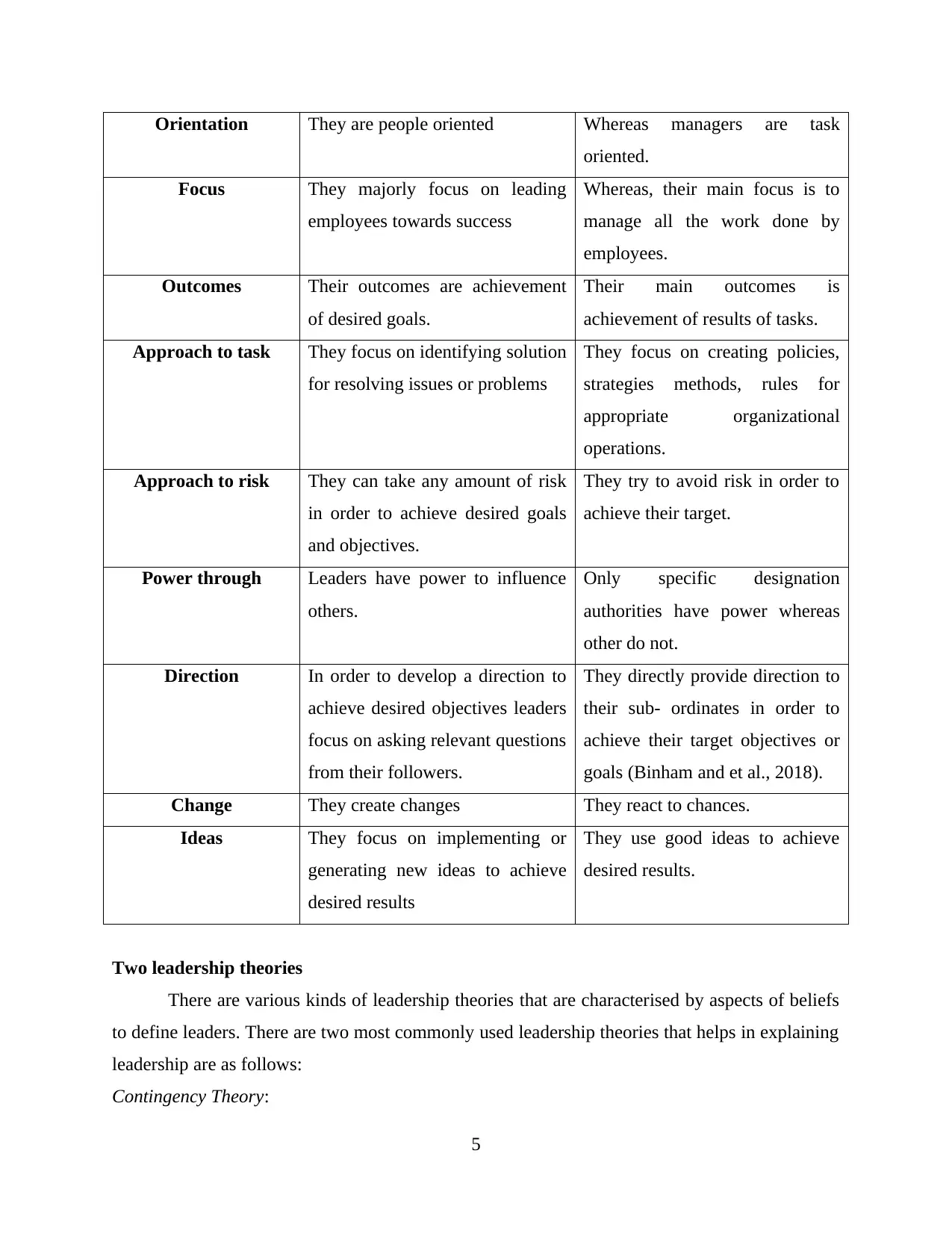
Orientation They are people oriented Whereas managers are task
oriented.
Focus They majorly focus on leading
employees towards success
Whereas, their main focus is to
manage all the work done by
employees.
Outcomes Their outcomes are achievement
of desired goals.
Their main outcomes is
achievement of results of tasks.
Approach to task They focus on identifying solution
for resolving issues or problems
They focus on creating policies,
strategies methods, rules for
appropriate organizational
operations.
Approach to risk They can take any amount of risk
in order to achieve desired goals
and objectives.
They try to avoid risk in order to
achieve their target.
Power through Leaders have power to influence
others.
Only specific designation
authorities have power whereas
other do not.
Direction In order to develop a direction to
achieve desired objectives leaders
focus on asking relevant questions
from their followers.
They directly provide direction to
their sub- ordinates in order to
achieve their target objectives or
goals (Binham and et al., 2018).
Change They create changes They react to chances.
Ideas They focus on implementing or
generating new ideas to achieve
desired results
They use good ideas to achieve
desired results.
Two leadership theories
There are various kinds of leadership theories that are characterised by aspects of beliefs
to define leaders. There are two most commonly used leadership theories that helps in explaining
leadership are as follows:
Contingency Theory:
5
oriented.
Focus They majorly focus on leading
employees towards success
Whereas, their main focus is to
manage all the work done by
employees.
Outcomes Their outcomes are achievement
of desired goals.
Their main outcomes is
achievement of results of tasks.
Approach to task They focus on identifying solution
for resolving issues or problems
They focus on creating policies,
strategies methods, rules for
appropriate organizational
operations.
Approach to risk They can take any amount of risk
in order to achieve desired goals
and objectives.
They try to avoid risk in order to
achieve their target.
Power through Leaders have power to influence
others.
Only specific designation
authorities have power whereas
other do not.
Direction In order to develop a direction to
achieve desired objectives leaders
focus on asking relevant questions
from their followers.
They directly provide direction to
their sub- ordinates in order to
achieve their target objectives or
goals (Binham and et al., 2018).
Change They create changes They react to chances.
Ideas They focus on implementing or
generating new ideas to achieve
desired results
They use good ideas to achieve
desired results.
Two leadership theories
There are various kinds of leadership theories that are characterised by aspects of beliefs
to define leaders. There are two most commonly used leadership theories that helps in explaining
leadership are as follows:
Contingency Theory:
5
Paraphrase This Document
Need a fresh take? Get an instant paraphrase of this document with our AI Paraphraser
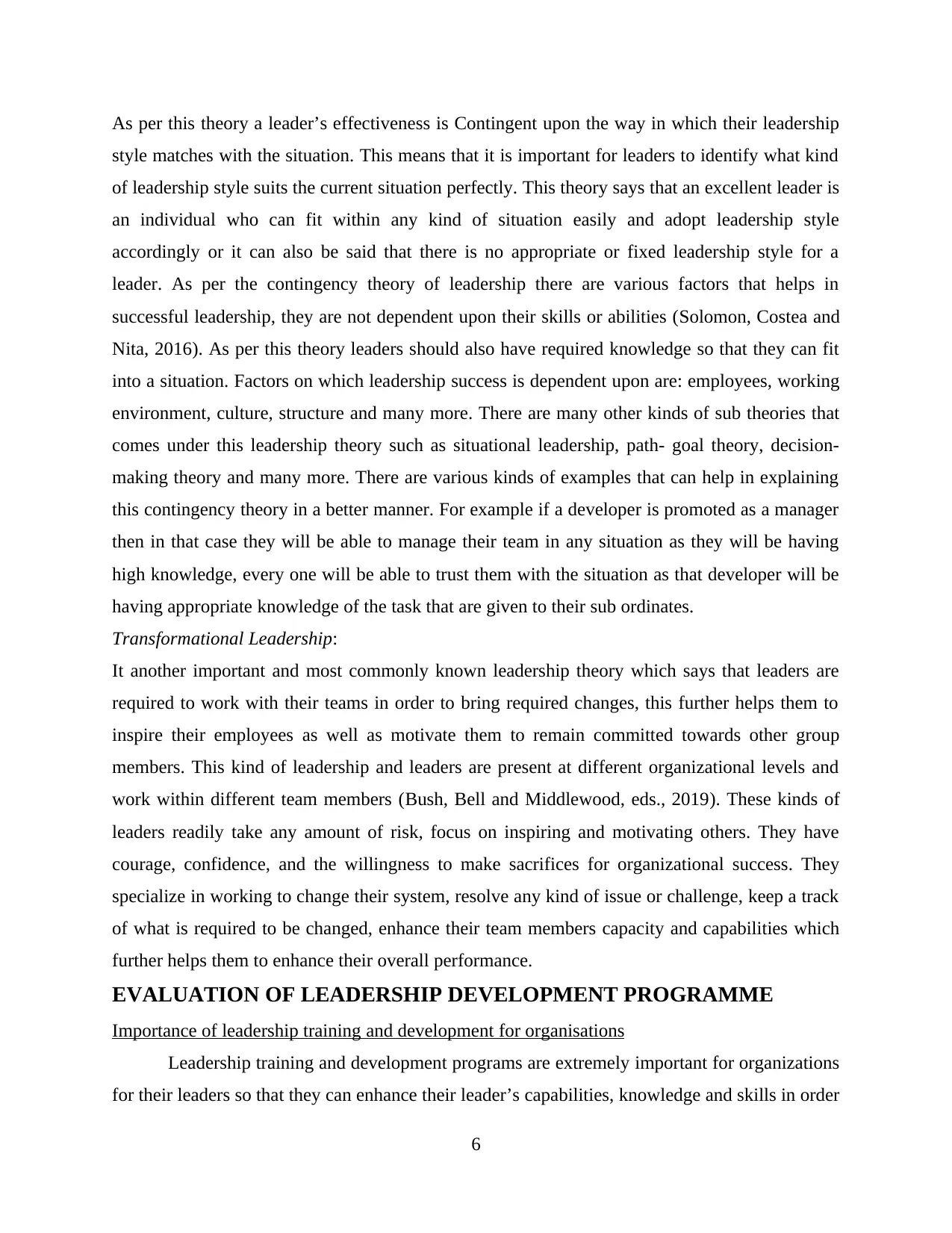
As per this theory a leader’s effectiveness is Contingent upon the way in which their leadership
style matches with the situation. This means that it is important for leaders to identify what kind
of leadership style suits the current situation perfectly. This theory says that an excellent leader is
an individual who can fit within any kind of situation easily and adopt leadership style
accordingly or it can also be said that there is no appropriate or fixed leadership style for a
leader. As per the contingency theory of leadership there are various factors that helps in
successful leadership, they are not dependent upon their skills or abilities (Solomon, Costea and
Nita, 2016). As per this theory leaders should also have required knowledge so that they can fit
into a situation. Factors on which leadership success is dependent upon are: employees, working
environment, culture, structure and many more. There are many other kinds of sub theories that
comes under this leadership theory such as situational leadership, path- goal theory, decision-
making theory and many more. There are various kinds of examples that can help in explaining
this contingency theory in a better manner. For example if a developer is promoted as a manager
then in that case they will be able to manage their team in any situation as they will be having
high knowledge, every one will be able to trust them with the situation as that developer will be
having appropriate knowledge of the task that are given to their sub ordinates.
Transformational Leadership:
It another important and most commonly known leadership theory which says that leaders are
required to work with their teams in order to bring required changes, this further helps them to
inspire their employees as well as motivate them to remain committed towards other group
members. This kind of leadership and leaders are present at different organizational levels and
work within different team members (Bush, Bell and Middlewood, eds., 2019). These kinds of
leaders readily take any amount of risk, focus on inspiring and motivating others. They have
courage, confidence, and the willingness to make sacrifices for organizational success. They
specialize in working to change their system, resolve any kind of issue or challenge, keep a track
of what is required to be changed, enhance their team members capacity and capabilities which
further helps them to enhance their overall performance.
EVALUATION OF LEADERSHIP DEVELOPMENT PROGRAMME
Importance of leadership training and development for organisations
Leadership training and development programs are extremely important for organizations
for their leaders so that they can enhance their leader’s capabilities, knowledge and skills in order
6
style matches with the situation. This means that it is important for leaders to identify what kind
of leadership style suits the current situation perfectly. This theory says that an excellent leader is
an individual who can fit within any kind of situation easily and adopt leadership style
accordingly or it can also be said that there is no appropriate or fixed leadership style for a
leader. As per the contingency theory of leadership there are various factors that helps in
successful leadership, they are not dependent upon their skills or abilities (Solomon, Costea and
Nita, 2016). As per this theory leaders should also have required knowledge so that they can fit
into a situation. Factors on which leadership success is dependent upon are: employees, working
environment, culture, structure and many more. There are many other kinds of sub theories that
comes under this leadership theory such as situational leadership, path- goal theory, decision-
making theory and many more. There are various kinds of examples that can help in explaining
this contingency theory in a better manner. For example if a developer is promoted as a manager
then in that case they will be able to manage their team in any situation as they will be having
high knowledge, every one will be able to trust them with the situation as that developer will be
having appropriate knowledge of the task that are given to their sub ordinates.
Transformational Leadership:
It another important and most commonly known leadership theory which says that leaders are
required to work with their teams in order to bring required changes, this further helps them to
inspire their employees as well as motivate them to remain committed towards other group
members. This kind of leadership and leaders are present at different organizational levels and
work within different team members (Bush, Bell and Middlewood, eds., 2019). These kinds of
leaders readily take any amount of risk, focus on inspiring and motivating others. They have
courage, confidence, and the willingness to make sacrifices for organizational success. They
specialize in working to change their system, resolve any kind of issue or challenge, keep a track
of what is required to be changed, enhance their team members capacity and capabilities which
further helps them to enhance their overall performance.
EVALUATION OF LEADERSHIP DEVELOPMENT PROGRAMME
Importance of leadership training and development for organisations
Leadership training and development programs are extremely important for organizations
for their leaders so that they can enhance their leader’s capabilities, knowledge and skills in order
6
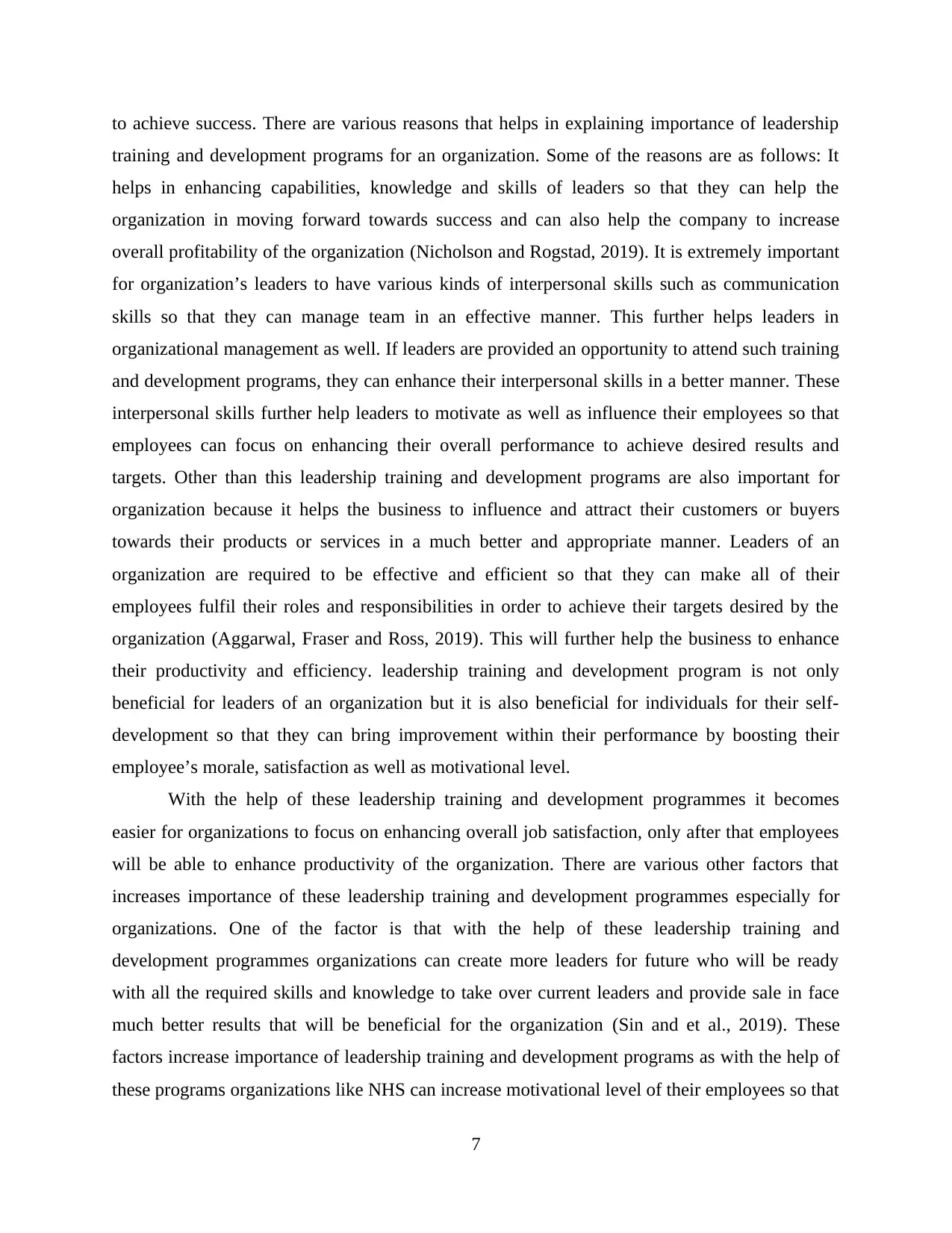
to achieve success. There are various reasons that helps in explaining importance of leadership
training and development programs for an organization. Some of the reasons are as follows: It
helps in enhancing capabilities, knowledge and skills of leaders so that they can help the
organization in moving forward towards success and can also help the company to increase
overall profitability of the organization (Nicholson and Rogstad, 2019). It is extremely important
for organization’s leaders to have various kinds of interpersonal skills such as communication
skills so that they can manage team in an effective manner. This further helps leaders in
organizational management as well. If leaders are provided an opportunity to attend such training
and development programs, they can enhance their interpersonal skills in a better manner. These
interpersonal skills further help leaders to motivate as well as influence their employees so that
employees can focus on enhancing their overall performance to achieve desired results and
targets. Other than this leadership training and development programs are also important for
organization because it helps the business to influence and attract their customers or buyers
towards their products or services in a much better and appropriate manner. Leaders of an
organization are required to be effective and efficient so that they can make all of their
employees fulfil their roles and responsibilities in order to achieve their targets desired by the
organization (Aggarwal, Fraser and Ross, 2019). This will further help the business to enhance
their productivity and efficiency. leadership training and development program is not only
beneficial for leaders of an organization but it is also beneficial for individuals for their self-
development so that they can bring improvement within their performance by boosting their
employee’s morale, satisfaction as well as motivational level.
With the help of these leadership training and development programmes it becomes
easier for organizations to focus on enhancing overall job satisfaction, only after that employees
will be able to enhance productivity of the organization. There are various other factors that
increases importance of these leadership training and development programmes especially for
organizations. One of the factor is that with the help of these leadership training and
development programmes organizations can create more leaders for future who will be ready
with all the required skills and knowledge to take over current leaders and provide sale in face
much better results that will be beneficial for the organization (Sin and et al., 2019). These
factors increase importance of leadership training and development programs as with the help of
these programs organizations like NHS can increase motivational level of their employees so that
7
training and development programs for an organization. Some of the reasons are as follows: It
helps in enhancing capabilities, knowledge and skills of leaders so that they can help the
organization in moving forward towards success and can also help the company to increase
overall profitability of the organization (Nicholson and Rogstad, 2019). It is extremely important
for organization’s leaders to have various kinds of interpersonal skills such as communication
skills so that they can manage team in an effective manner. This further helps leaders in
organizational management as well. If leaders are provided an opportunity to attend such training
and development programs, they can enhance their interpersonal skills in a better manner. These
interpersonal skills further help leaders to motivate as well as influence their employees so that
employees can focus on enhancing their overall performance to achieve desired results and
targets. Other than this leadership training and development programs are also important for
organization because it helps the business to influence and attract their customers or buyers
towards their products or services in a much better and appropriate manner. Leaders of an
organization are required to be effective and efficient so that they can make all of their
employees fulfil their roles and responsibilities in order to achieve their targets desired by the
organization (Aggarwal, Fraser and Ross, 2019). This will further help the business to enhance
their productivity and efficiency. leadership training and development program is not only
beneficial for leaders of an organization but it is also beneficial for individuals for their self-
development so that they can bring improvement within their performance by boosting their
employee’s morale, satisfaction as well as motivational level.
With the help of these leadership training and development programmes it becomes
easier for organizations to focus on enhancing overall job satisfaction, only after that employees
will be able to enhance productivity of the organization. There are various other factors that
increases importance of these leadership training and development programmes especially for
organizations. One of the factor is that with the help of these leadership training and
development programmes organizations can create more leaders for future who will be ready
with all the required skills and knowledge to take over current leaders and provide sale in face
much better results that will be beneficial for the organization (Sin and et al., 2019). These
factors increase importance of leadership training and development programs as with the help of
these programs organizations like NHS can increase motivational level of their employees so that
7
⊘ This is a preview!⊘
Do you want full access?
Subscribe today to unlock all pages.

Trusted by 1+ million students worldwide
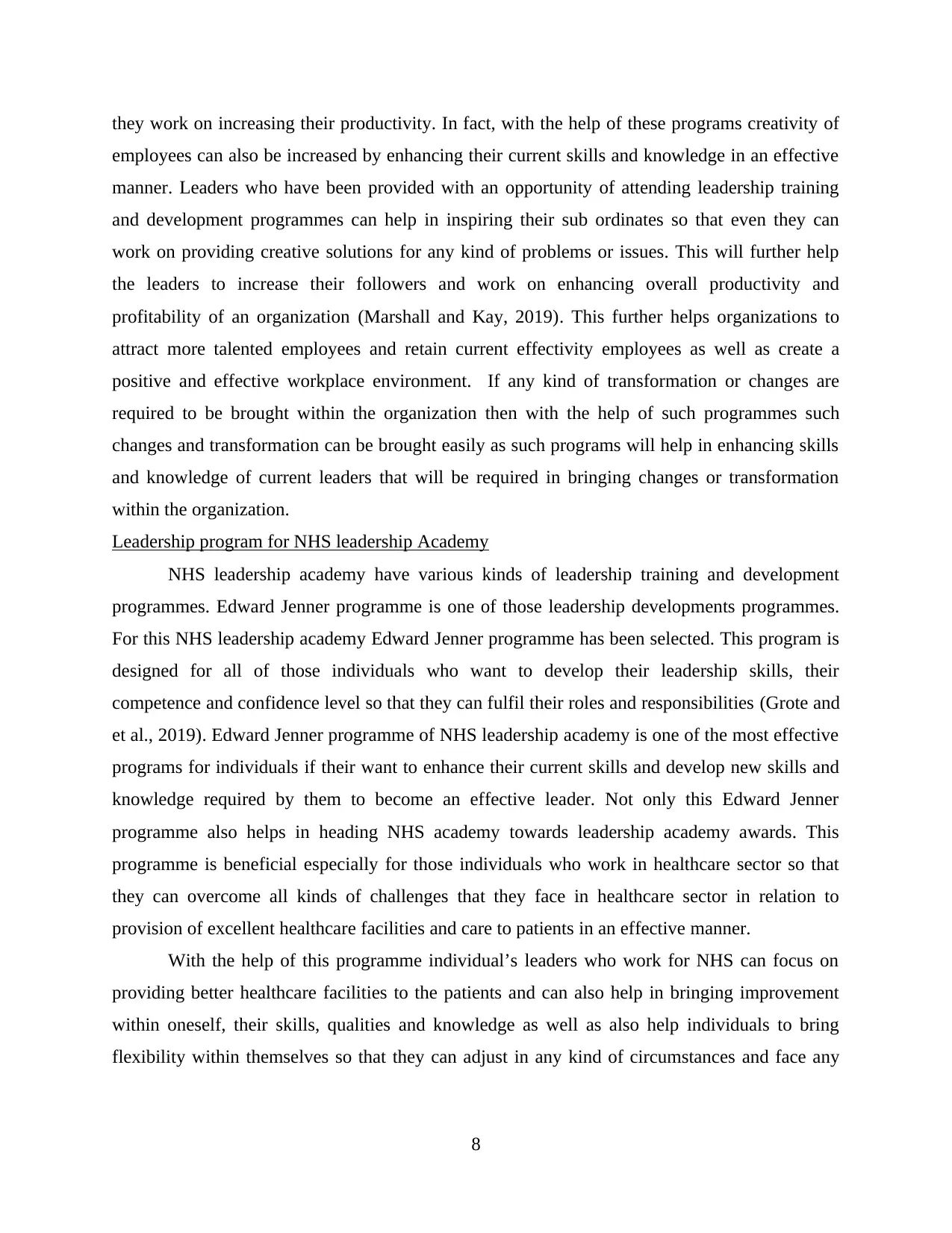
they work on increasing their productivity. In fact, with the help of these programs creativity of
employees can also be increased by enhancing their current skills and knowledge in an effective
manner. Leaders who have been provided with an opportunity of attending leadership training
and development programmes can help in inspiring their sub ordinates so that even they can
work on providing creative solutions for any kind of problems or issues. This will further help
the leaders to increase their followers and work on enhancing overall productivity and
profitability of an organization (Marshall and Kay, 2019). This further helps organizations to
attract more talented employees and retain current effectivity employees as well as create a
positive and effective workplace environment. If any kind of transformation or changes are
required to be brought within the organization then with the help of such programmes such
changes and transformation can be brought easily as such programs will help in enhancing skills
and knowledge of current leaders that will be required in bringing changes or transformation
within the organization.
Leadership program for NHS leadership Academy
NHS leadership academy have various kinds of leadership training and development
programmes. Edward Jenner programme is one of those leadership developments programmes.
For this NHS leadership academy Edward Jenner programme has been selected. This program is
designed for all of those individuals who want to develop their leadership skills, their
competence and confidence level so that they can fulfil their roles and responsibilities (Grote and
et al., 2019). Edward Jenner programme of NHS leadership academy is one of the most effective
programs for individuals if their want to enhance their current skills and develop new skills and
knowledge required by them to become an effective leader. Not only this Edward Jenner
programme also helps in heading NHS academy towards leadership academy awards. This
programme is beneficial especially for those individuals who work in healthcare sector so that
they can overcome all kinds of challenges that they face in healthcare sector in relation to
provision of excellent healthcare facilities and care to patients in an effective manner.
With the help of this programme individual’s leaders who work for NHS can focus on
providing better healthcare facilities to the patients and can also help in bringing improvement
within oneself, their skills, qualities and knowledge as well as also help individuals to bring
flexibility within themselves so that they can adjust in any kind of circumstances and face any
8
employees can also be increased by enhancing their current skills and knowledge in an effective
manner. Leaders who have been provided with an opportunity of attending leadership training
and development programmes can help in inspiring their sub ordinates so that even they can
work on providing creative solutions for any kind of problems or issues. This will further help
the leaders to increase their followers and work on enhancing overall productivity and
profitability of an organization (Marshall and Kay, 2019). This further helps organizations to
attract more talented employees and retain current effectivity employees as well as create a
positive and effective workplace environment. If any kind of transformation or changes are
required to be brought within the organization then with the help of such programmes such
changes and transformation can be brought easily as such programs will help in enhancing skills
and knowledge of current leaders that will be required in bringing changes or transformation
within the organization.
Leadership program for NHS leadership Academy
NHS leadership academy have various kinds of leadership training and development
programmes. Edward Jenner programme is one of those leadership developments programmes.
For this NHS leadership academy Edward Jenner programme has been selected. This program is
designed for all of those individuals who want to develop their leadership skills, their
competence and confidence level so that they can fulfil their roles and responsibilities (Grote and
et al., 2019). Edward Jenner programme of NHS leadership academy is one of the most effective
programs for individuals if their want to enhance their current skills and develop new skills and
knowledge required by them to become an effective leader. Not only this Edward Jenner
programme also helps in heading NHS academy towards leadership academy awards. This
programme is beneficial especially for those individuals who work in healthcare sector so that
they can overcome all kinds of challenges that they face in healthcare sector in relation to
provision of excellent healthcare facilities and care to patients in an effective manner.
With the help of this programme individual’s leaders who work for NHS can focus on
providing better healthcare facilities to the patients and can also help in bringing improvement
within oneself, their skills, qualities and knowledge as well as also help individuals to bring
flexibility within themselves so that they can adjust in any kind of circumstances and face any
8
Paraphrase This Document
Need a fresh take? Get an instant paraphrase of this document with our AI Paraphraser
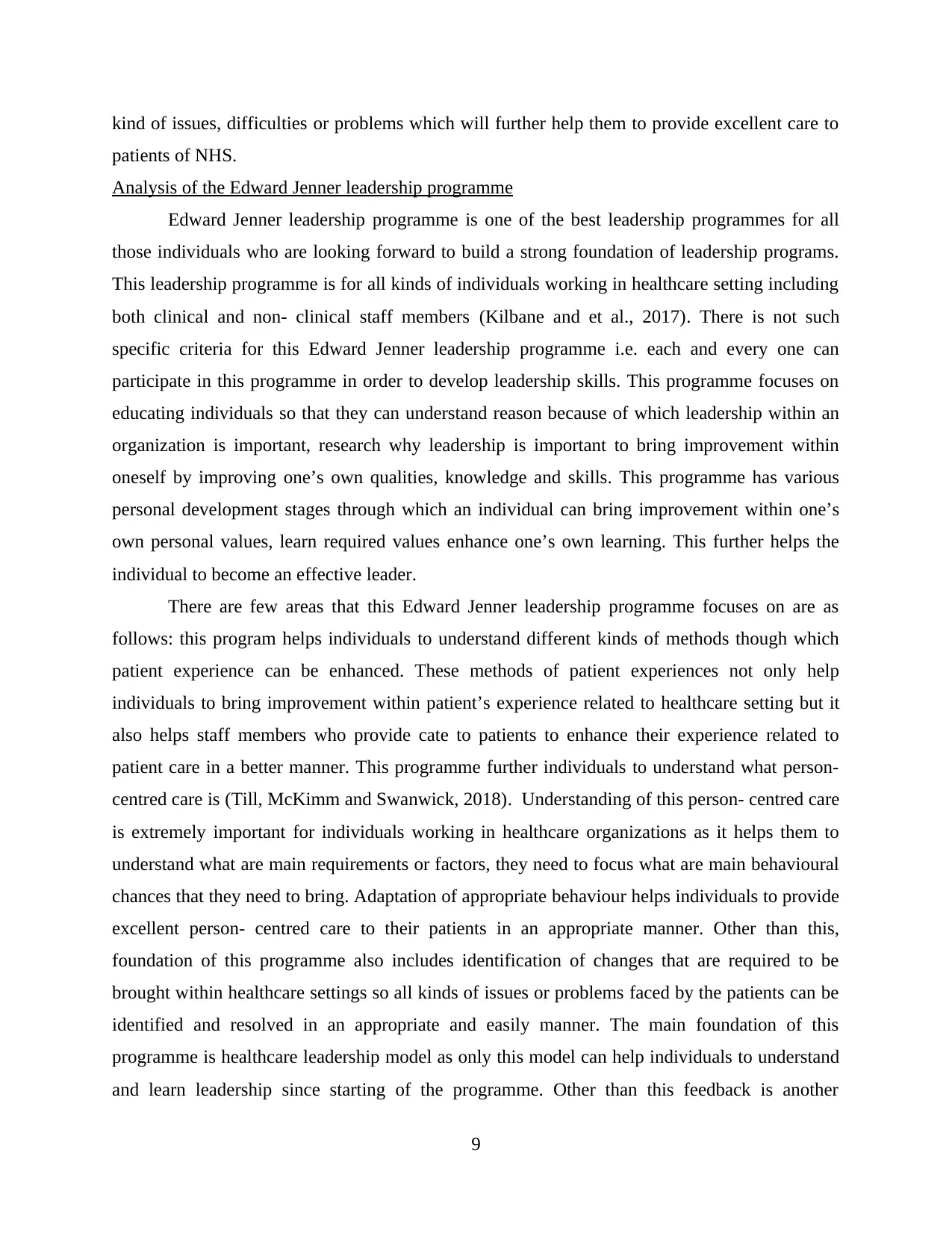
kind of issues, difficulties or problems which will further help them to provide excellent care to
patients of NHS.
Analysis of the Edward Jenner leadership programme
Edward Jenner leadership programme is one of the best leadership programmes for all
those individuals who are looking forward to build a strong foundation of leadership programs.
This leadership programme is for all kinds of individuals working in healthcare setting including
both clinical and non- clinical staff members (Kilbane and et al., 2017). There is not such
specific criteria for this Edward Jenner leadership programme i.e. each and every one can
participate in this programme in order to develop leadership skills. This programme focuses on
educating individuals so that they can understand reason because of which leadership within an
organization is important, research why leadership is important to bring improvement within
oneself by improving one’s own qualities, knowledge and skills. This programme has various
personal development stages through which an individual can bring improvement within one’s
own personal values, learn required values enhance one’s own learning. This further helps the
individual to become an effective leader.
There are few areas that this Edward Jenner leadership programme focuses on are as
follows: this program helps individuals to understand different kinds of methods though which
patient experience can be enhanced. These methods of patient experiences not only help
individuals to bring improvement within patient’s experience related to healthcare setting but it
also helps staff members who provide cate to patients to enhance their experience related to
patient care in a better manner. This programme further individuals to understand what person-
centred care is (Till, McKimm and Swanwick, 2018). Understanding of this person- centred care
is extremely important for individuals working in healthcare organizations as it helps them to
understand what are main requirements or factors, they need to focus what are main behavioural
chances that they need to bring. Adaptation of appropriate behaviour helps individuals to provide
excellent person- centred care to their patients in an appropriate manner. Other than this,
foundation of this programme also includes identification of changes that are required to be
brought within healthcare settings so all kinds of issues or problems faced by the patients can be
identified and resolved in an appropriate and easily manner. The main foundation of this
programme is healthcare leadership model as only this model can help individuals to understand
and learn leadership since starting of the programme. Other than this feedback is another
9
patients of NHS.
Analysis of the Edward Jenner leadership programme
Edward Jenner leadership programme is one of the best leadership programmes for all
those individuals who are looking forward to build a strong foundation of leadership programs.
This leadership programme is for all kinds of individuals working in healthcare setting including
both clinical and non- clinical staff members (Kilbane and et al., 2017). There is not such
specific criteria for this Edward Jenner leadership programme i.e. each and every one can
participate in this programme in order to develop leadership skills. This programme focuses on
educating individuals so that they can understand reason because of which leadership within an
organization is important, research why leadership is important to bring improvement within
oneself by improving one’s own qualities, knowledge and skills. This programme has various
personal development stages through which an individual can bring improvement within one’s
own personal values, learn required values enhance one’s own learning. This further helps the
individual to become an effective leader.
There are few areas that this Edward Jenner leadership programme focuses on are as
follows: this program helps individuals to understand different kinds of methods though which
patient experience can be enhanced. These methods of patient experiences not only help
individuals to bring improvement within patient’s experience related to healthcare setting but it
also helps staff members who provide cate to patients to enhance their experience related to
patient care in a better manner. This programme further individuals to understand what person-
centred care is (Till, McKimm and Swanwick, 2018). Understanding of this person- centred care
is extremely important for individuals working in healthcare organizations as it helps them to
understand what are main requirements or factors, they need to focus what are main behavioural
chances that they need to bring. Adaptation of appropriate behaviour helps individuals to provide
excellent person- centred care to their patients in an appropriate manner. Other than this,
foundation of this programme also includes identification of changes that are required to be
brought within healthcare settings so all kinds of issues or problems faced by the patients can be
identified and resolved in an appropriate and easily manner. The main foundation of this
programme is healthcare leadership model as only this model can help individuals to understand
and learn leadership since starting of the programme. Other than this feedback is another
9
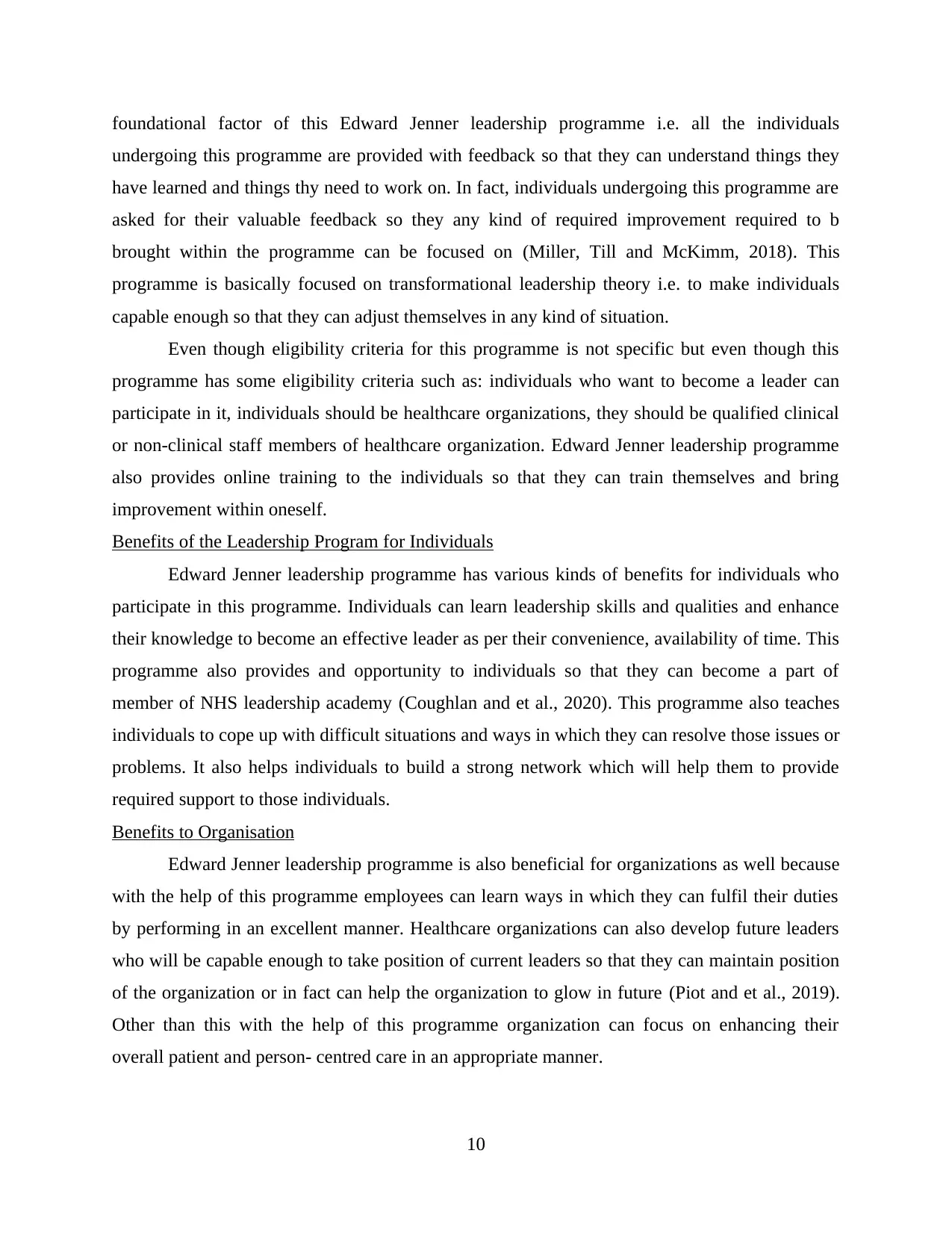
foundational factor of this Edward Jenner leadership programme i.e. all the individuals
undergoing this programme are provided with feedback so that they can understand things they
have learned and things thy need to work on. In fact, individuals undergoing this programme are
asked for their valuable feedback so they any kind of required improvement required to b
brought within the programme can be focused on (Miller, Till and McKimm, 2018). This
programme is basically focused on transformational leadership theory i.e. to make individuals
capable enough so that they can adjust themselves in any kind of situation.
Even though eligibility criteria for this programme is not specific but even though this
programme has some eligibility criteria such as: individuals who want to become a leader can
participate in it, individuals should be healthcare organizations, they should be qualified clinical
or non-clinical staff members of healthcare organization. Edward Jenner leadership programme
also provides online training to the individuals so that they can train themselves and bring
improvement within oneself.
Benefits of the Leadership Program for Individuals
Edward Jenner leadership programme has various kinds of benefits for individuals who
participate in this programme. Individuals can learn leadership skills and qualities and enhance
their knowledge to become an effective leader as per their convenience, availability of time. This
programme also provides and opportunity to individuals so that they can become a part of
member of NHS leadership academy (Coughlan and et al., 2020). This programme also teaches
individuals to cope up with difficult situations and ways in which they can resolve those issues or
problems. It also helps individuals to build a strong network which will help them to provide
required support to those individuals.
Benefits to Organisation
Edward Jenner leadership programme is also beneficial for organizations as well because
with the help of this programme employees can learn ways in which they can fulfil their duties
by performing in an excellent manner. Healthcare organizations can also develop future leaders
who will be capable enough to take position of current leaders so that they can maintain position
of the organization or in fact can help the organization to glow in future (Piot and et al., 2019).
Other than this with the help of this programme organization can focus on enhancing their
overall patient and person- centred care in an appropriate manner.
10
undergoing this programme are provided with feedback so that they can understand things they
have learned and things thy need to work on. In fact, individuals undergoing this programme are
asked for their valuable feedback so they any kind of required improvement required to b
brought within the programme can be focused on (Miller, Till and McKimm, 2018). This
programme is basically focused on transformational leadership theory i.e. to make individuals
capable enough so that they can adjust themselves in any kind of situation.
Even though eligibility criteria for this programme is not specific but even though this
programme has some eligibility criteria such as: individuals who want to become a leader can
participate in it, individuals should be healthcare organizations, they should be qualified clinical
or non-clinical staff members of healthcare organization. Edward Jenner leadership programme
also provides online training to the individuals so that they can train themselves and bring
improvement within oneself.
Benefits of the Leadership Program for Individuals
Edward Jenner leadership programme has various kinds of benefits for individuals who
participate in this programme. Individuals can learn leadership skills and qualities and enhance
their knowledge to become an effective leader as per their convenience, availability of time. This
programme also provides and opportunity to individuals so that they can become a part of
member of NHS leadership academy (Coughlan and et al., 2020). This programme also teaches
individuals to cope up with difficult situations and ways in which they can resolve those issues or
problems. It also helps individuals to build a strong network which will help them to provide
required support to those individuals.
Benefits to Organisation
Edward Jenner leadership programme is also beneficial for organizations as well because
with the help of this programme employees can learn ways in which they can fulfil their duties
by performing in an excellent manner. Healthcare organizations can also develop future leaders
who will be capable enough to take position of current leaders so that they can maintain position
of the organization or in fact can help the organization to glow in future (Piot and et al., 2019).
Other than this with the help of this programme organization can focus on enhancing their
overall patient and person- centred care in an appropriate manner.
10
⊘ This is a preview!⊘
Do you want full access?
Subscribe today to unlock all pages.

Trusted by 1+ million students worldwide
1 out of 15
Related Documents
Your All-in-One AI-Powered Toolkit for Academic Success.
+13062052269
info@desklib.com
Available 24*7 on WhatsApp / Email
![[object Object]](/_next/static/media/star-bottom.7253800d.svg)
Unlock your academic potential
Copyright © 2020–2026 A2Z Services. All Rights Reserved. Developed and managed by ZUCOL.





